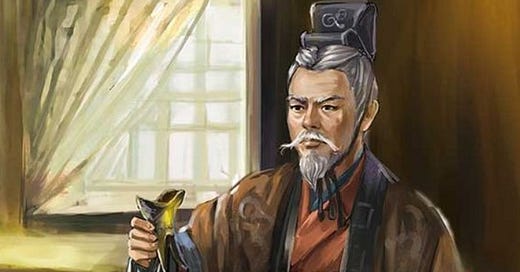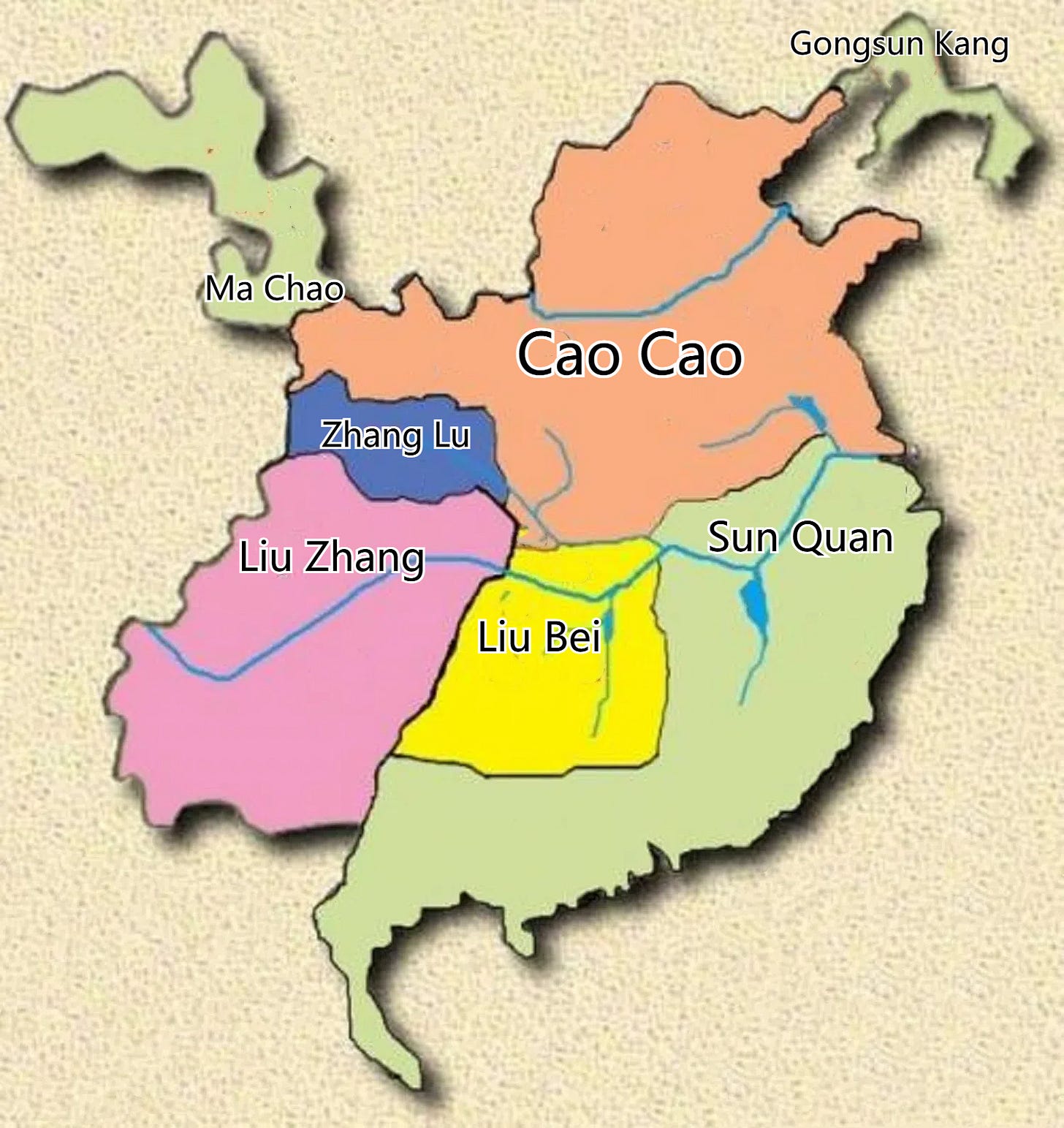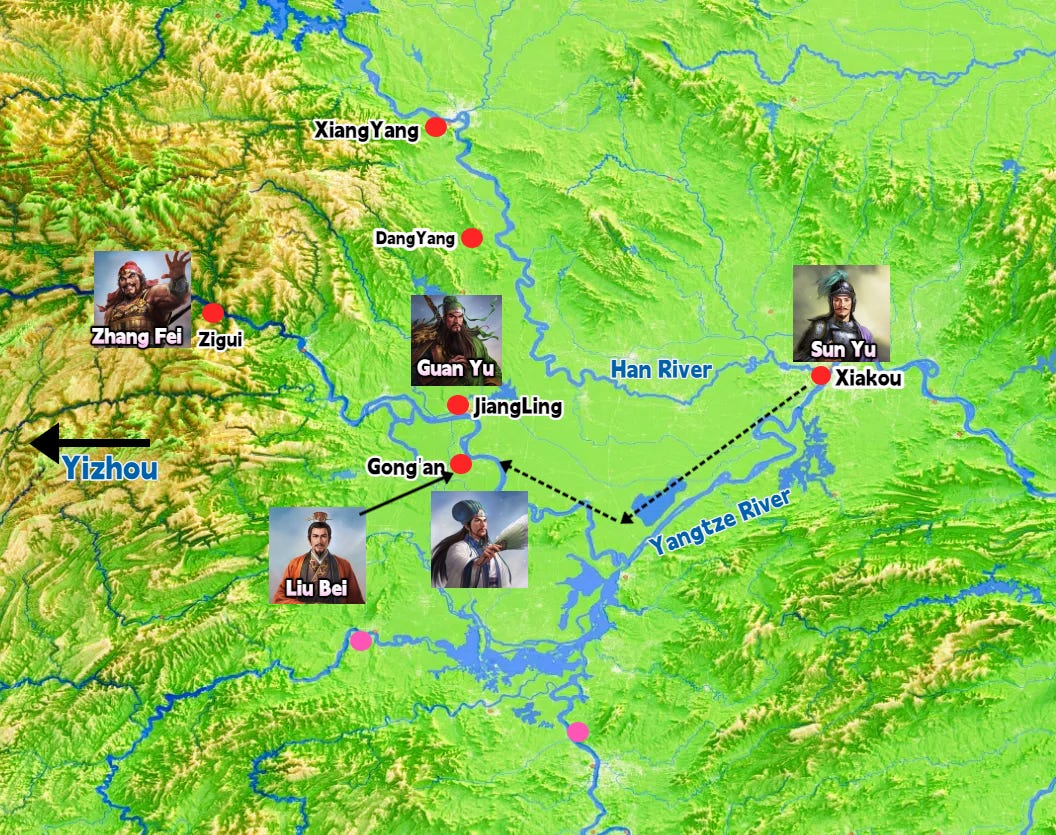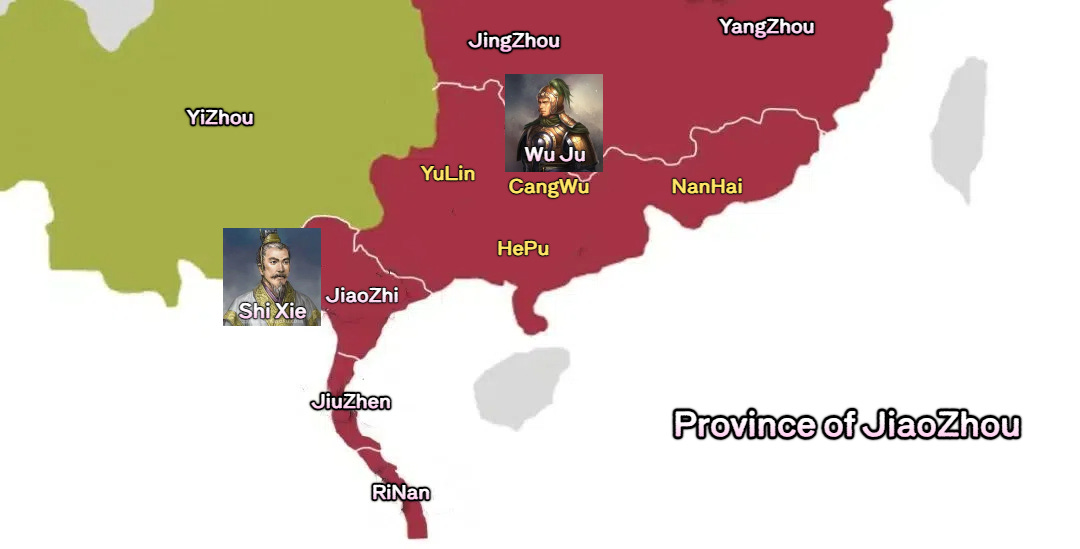The Southern Gambit: Wu's Conquest of Jiaozhou(Three Kingdoms 64)211-212AD
How did Sun Quan easily take over places as present-day Guangdong, Guangxi and Vietnam?
Previous Chapter :The Death of Zhou Yu - A Hero's Premature Demise
After lending the southern part of Nanjun Commandery to Liu Bei刘备, Sun Quan孙权 still hadn't given up on his ambition to seize Yizhou. He sent an envoy again to persuade Liu Bei, saying:
"Liu Zhang刘璋 is no capable ruler—he cannot hold on to Yizhou by himself. Sooner or later, Yizhou will fall. If it is taken by Cao Cao, then Jingzhou will be in grave danger. Let us march into Yizhou together—first defeat Liu Zhang, then destroy Zhang Lu张鲁, and unify the south. By then, even if there were ten Cao Caos, we would have nothing to fear!"
Liu Bei, however, intended to seize Yizhou alone and had no desire to let Sun Quan interfere.
By this time, Zhou Yu had died, and strategic entry points to Yizhou were all already under Liu Bei’s control. Thus, he felt much more confident in refusing Sun Quan outright.
So Liu Bei replied to Sun Quan:
"Though Liu Zhang is weak, he is capable of defending himself. Moreover, the three of us are allies against Cao Cao—how can we turn on each other? As for attacking Yizhou, I think we should drop the idea!"
It was unclear whether Sun Quan was deliberately testing Liu Bei's resolve or had become enamored with Zhou Yu's "Partition of the World into Two" Strategy.
Ignoring Liu Bei's response, Sun Quan dispatched his cousin Sun Yu孙瑜 with a large army to station at Xiakou夏口, intending to advance westward along the Yangtze River.
Seeing this, Liu Bei ordered Guan Yu关羽 to garrison Jiangling江陵, Zhang Fei张飞 to hold ZiGui秭归, and Zhuge Liang诸葛亮 to set up camp along the southern riverbank, while he himself took command at Gong'an公安. His forces stood ready for battle, treating the situation as a dire threat, and firmly blocked the Wu吴 army's passage.
Liu Bei then sent an envoy to Xiakou to deliver a stern warning to Sun Yu:
"If you insist on attacking Yizhou, I would rather let down my hair and retreat to the wilderness than break faith with the world!"
This was an unmistakably severe statement—Liu Bei's implied message was clear: "I will protect my ally Liu Zhang! No one may move against him, or I will not hesitate to turn hostile!"
Unable to advance, Sun Yu had no choice but to report back to Sun Quan, who then recalled Sun Yu's army.
Later, when news reached Eastern Wu that Liu Bei had led his troops into Yizhou, Sun Quan flew into a rage and cursed:
"Deceitful villain! How dare he trick me?!"
But no matter how furious Sun Quan was, it was futile. With his northern advance thwarted and his westward push blocked, he could only turn his attention southward—to Jiaozhou交州.
At the end of 210 AD, Sun Quan appointed Bu Zhi步骘 as the Provincial Governor of Jiaozhou, ordering him to lead over a thousand troops south to take control of the region.
At that time, Jiaozhou consisted of seven commanderies. Six of them—Jiaozhi交趾(around Hanoi, Vietnam ), Hepu合浦(in Beihai,Guangxi), Jiuzhen九真(Northeastern Vietnam ), Nanhai南海(most of Guangdong), Yulin郁林(most of Guangxi), and Rinan日南(Central Vietnam)—were under Shi Xie's士燮 control, with their Governors being either Shi Xie himself or his clan members. Only Cangwu苍梧 Commandery(Junction of Guangxi, Guangdong and Hunan) was held by Wu Ju吴巨, a former general under Liu Biao, who served as its Governor
Shi Xie was an exceptionally shrewd man. No matter how chaotic the realm became, he never made enemies with anyone. Not only did he maintain good relations with neighboring warlords like Sun Quan, Liu Biao, and Liu Bei, but he also regularly sent tribute and envoys to the distant Emperor Xian of Han(汉献帝reigned 189-220AD) and Cao Cao in the Central Plains. Domestically, he treated scholars with courtesy, governed with generosity, and worked diligently to pacify the people, attracting renowned figures of national stature—such as Xu Jing许靖 and Liu Ba刘巴—to seek refuge under him.
Among all the regional warlords of that era, Shi Xie was arguably the most well-regarded.
Shi Xie knew he was no match for Sun Quan. Therefore, when Bu Zhi arrived to assume office, Shi Xie immediately pledged allegiance. He even sent his own son to Eastern Wu as a hostage and presented Sun Quan with a large quantity of rare treasures as gifts.
Sun Quan was highly satisfied with Shi Xie's submissive attitude. Considering that Jiaozhou was far from the Central Plains, inhabited by numerous ethnic minorities with fierce customs, and difficult to govern by outsiders, Sun Quan granted Shi Xie the additional title of General of the Left while allowing him to retain his original position in Jiaozhou. Shi Xie's relatives serving as Governors in other commanderies also received promotions.
Thus, the six commanderies of Jiaozhou were incorporated into Sun Quan's sphere of influence.
Bu Zhi understood that Wu Ju, the Governor of Cangwu, would not sincerely submit to Sun Quan and thus sought to eliminate him covertly.
Wu Ju, a military officer by background, was a fierce warrior with 5,000 troops under his command, including an exceptionally valiant general named Ou Jing区景.
In a direct assault, Bu Zhi—leading just over a thousand men—stood little chance of victory.
Therefore, under the authority of Governor of Jiaozhou, he invited Wu Ju to a meeting.
Wu Ju knew Bu Zhi had few troops under his command and believed that as long as Ou Jing stayed behind, Bu Zhi wouldn’t dare harm him.
Before setting off to meet Bu Zhi, Wu Ju handed military authority to Ou Jing and repeatedly warned him: "Do not go to see Bu Zhi until I return!"
Upon arriving in Jiaozhi, Wu Ju was immediately detained by Bu Zhi. Bu Zhi then sent messengers to summon Ou Jing.
Ou Jing initially refused, but after relentless persuasion and repeated invitations from Bu Zhi, he eventually went to Jiaozhi.
As expected, the physically strong but simple-minded Ou Jing and the helpless Wu Ju were both swiftly executed by Bu Zhi.
When the news reached Cangwu, Wu Ju's subordinates rose in rebellion. However, leaderless and disorganized, they were quickly suppressed by Bu Zhi.
With this, the entire territory of Jiaozhou was brought under Sun Quan's control.
By this time, the year had turned to 211 AD.
This year saw three pivotal developments:
Sun Quan moved his capital to Jianye建业(today’s Nanjing)
Liu Bei marched into Yizhou
Cao Cao was preoccupied with pacifying Guanzhong
The smoke of the "Battle of Red Cliffs" two years prior had long dissipated. The main theater of the Three Kingdoms' struggle temporarily shifted from the "Contest for Jingzhou" to what might be called the "Wild West Campaign."
To be Continued.
Your support is my greatest motivation!







